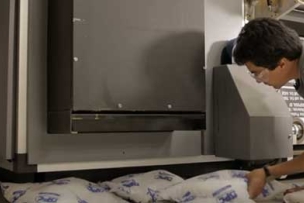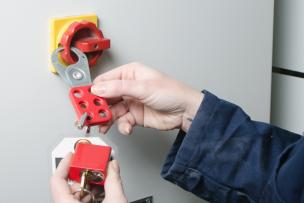Narrator:
Welcome to Creating A Safer Workplace by MSC Direct, featuring the web series, Nothing Stops U.S. Manufacturing. Conversations with safety professionals in the field. Here's your host, Anthony Testa.
Anthony Testa:
I'm joined today by members of the National Marker Company, a leading manufacturer in safety identification, lockout/tagout and compliance products. I'm with Michael Black, President and Owner of National Marker; Andrew Ellison, Director of Operations; and Patrick Meehan, Product Manager for National Marker.
Anthony Testa:
Michael, I want to start with you. In today's new normal in terms of the many hats that you're wearing, you're dealing with your U.S. manufacturing, and then you're also dealing with getting those products out to customers to make them more safe in the manufacturing environment that they're working in. How are you balancing that?
Michael Black:
There's a couple of things in regards to that. Before we were trying to protect our customers, we needed to protect ourselves first. So from a manufacturing standpoint, some of the things that we did from a pivot role was that, as soon as it was announced that there would be separation, is that we moved everyone out as remote. I recognized the importance of protecting my manufacturing workforce.
We then took what we were doing internally, and then started sharing that very early in the month of March and what was going on, and the uncertainty of what was going on. Because of the help of my team, the product development side, we were able to pivot and build different products for a level of communications, so that whether it be by the federal, by the state, by the county laws, that we could be able to communicate by the speed and the sight, of where the direction of, where that company wanted to go.
Anthony Testa:
So Andrew, being the Director of Operations, what has changed for you and your team? What are you doing differently today?
Andrew Ellison:
In general, we've had to put some pretty stringent protocols in place around the entrance and exit of associates and visitors into the building. For example, we're conducting a wellness check at every shift change for the associates who are entering the building. So we've had to do a lot of that and we've also had to work with our associates to social distance and that's not something by the way, that comes easy or natural.
I felt that the associates here that made up our essential workers, really did lean into what was being asked of them. And I saw a tremendous amount of leadership from so many people who, as soon as they realized that they were going to have to change the way that they worked, they were going to have to change some of their day-to-day activities, they took ownership of that. They volunteered to make changes. So we had a lot of people who really leaned into what was being asked and evolved to support what the new normal was.
Michael Black:
When we were pivoting our products that were being sold, we were selling product of almost 50% of our sales was on stuff that was different than what was 30 days ago. So he had an outline, a complete strategy, of changing our whole production floor.
So not only was it change the production floor to manufacture, it was changing the production floor to try to at least allow that six foot distancing, allow that mask use, utilizing technology for some of the lifting and investing in some of that. You really did an awesome job.
Anthony Testa:
Patrick, talk to us a little bit about, again, the pieces where people within manufacturing today, they're scaling back versus National Marker that's come out with hundreds of products in the last 60 days. I mean, it's unbelievable to see. Just give me a little bit of background about that and talk a little bit about those products and those innovations and what was the driving force of it.
Patrick Meehan:
This whole operating in the new normal, that's a very challenging thing to undertake and to operate in a new normal, you need to create a new normal. And that really starts with people changing their behavior. We need to evolve as individuals in our personal and professional life and as organizations. And that's a very difficult thing to do. We emulate, we emulate what we see, we emulate what we're told, but it's really a visual thing.
And when it comes to that, signage is really the first line of defense. That is a complete ecosystem of any type of facility. So we wanted to have a complete comprehensive line of products that allowed a facility to create that new normal and to really engage employees wherever they were inside or outside of that building, regardless of industry.
Anthony Testa:
And one of the things that you just said is, I love, I want to coin the phrase, creating the new normal. Creating that new normal, as opposed to just sitting back and waiting for the rules, I think you guys are actually creating it. And one of the pieces that I've been seeing is that the National Marker team and the MSC team, specifically the folks on my team, that collaboration to bring these shadowboards to life, these worker wellness boards to life. Can you just talk a little bit about that and how we are creating together a new normal?
Patrick Meehan:
Absolutely. So what we did there is we said to ourself, "Okay, we need to create safe facilities. And where does that start? It starts with protecting the people that come into them." Their first touch point is the entranceway. And what that ended up looking like from a new product standpoint was a very comprehensive, large format, wall-mounted sign that was intended to be mounted in the entrance to a facility that outlines with verbiage and visuals and icons, the safety protocols that are in place throughout that building.
It brings awareness to symptoms. If you're feeling symptomatic in any type of way, it brings awareness and there's a bit of a self-assessment that takes place right there. It's very easy to follow a step-by-step-by-step process that each individual needs to go through before they continue into that facility. It starts with hand sanitizing, so there is a touchless hand sanitizer station mounted to that workplace wellness station. It's then also a place where you can don the proper PPE. You can grab a pair of gloves in a variety of sizes. You can apply a mask from a dispenser. You can grab ear plugs as well.
And it also gives you visual cues of the identification that you'll see throughout that facility, signage on the walls, signage on the floors. What do I need to see, observe and act upon to promote a healthy environment in this building?
Anthony Testa:
Overall, during this, how many skus did you guys develop? How many skus did National Marker develop over the last three months? Ballpark?
Patrick Meehan:
Well, I actually, I think we looked at this number yesterday and the number was over 4,000.
Anthony Testa:
4,000 skus. That's amazing. And just talk a little bit about why signage is so important right now. I mean, what is critical in the marketplace and within manufacturing?
Patrick Meehan:
Specifically, we worked recently with MSC at a Toyota Motors manufacturing facility in Texas. And they decided to brand every piece of signage that they brought in, because they thought that that was their absolute best chance at gaining employee mind share, having employees adopt the message. So what we've seen is organizations leaning in, they want to invest in this. There's a learning curve there for individuals and to effectively change that behavior, it's going to take time. So we need products that are designed with longevity in mind.
Michael Black:
It was about six years ago, that we did a little bit of a survey. We found out some information that, when a company brands their messaging and their signs, the associates in that organization have a tendency to listen to that message 70% more than if it's just a generic sign. So with the evolving and changing of different things and different rules and regulations that can, again, be affected by town, county, state level.
The one thing we've learned, and Patrick and his group have done a phenomenal job, is that we do so much custom work that every day we will review the custom signs that we were creating for people. You know, as simple as, we've always seen that sign, no shirt, no shoes, no service. Well, we kind of came up with a little whimsical that said, no mask, no shoes, no shirt, no service. Well next thing, we sold a thousand of those things like in the first week. So the fact that we create that, we can brand that, we can make it specific to you, and we can do it when you're no longer there by creating that message, I think that's our responsibility. That's what we do as a manufacturer. And we have to do it accurately and we have to do it very quickly, so that all others can understand.
Andrew Ellison:
I'm not in marketing, so I don't have cool catch phrases like Patrick Meehan. I don't got to come up with creating a new normal. I don't come up with leaning in like, I'm not that good, but the 4,000 skus in a couple of months is a remarkable feat, but it means nothing if marketing launched a bunch of product that manufacturing couldn't produce.
And I thought the marketing group that was put together to launch new product around a new normal did a phenomenal job of involving the manufacturing group, collaborating with them to make sure that they picked product that could be manufactured and learned by the manufacturing team pretty quickly. And that allowed us to not just have skus on our website, but it allowed us to put the product in the customer's hand.
Anthony Testa:
And then just, make no mistake and just to clarify, right? So it's that 4,000 skus in a very short time on top of all the other products that you guys manufacture, on top of all the customs that you guys do. So, I got to go back to, and I'm going to end with you, Michael, in terms of, how are you doing it? How are you going to keep this and going through that barrier and really going to keep motivating your team to continue to drive this type of engagement and continue to drive this type of output?
Michael Black:
When you go through this, you learn a tremendous amount, not only about yourself, your leadership, but the organization. And you know what? I think we found purpose. I think my encouragement is, is that when we fail is we take it as an educational piece of what have we learned, and we do it that way. And it's never a mistake unless we do the same thing twice, right? You're trying new things. And when somebody falls, my expectation of an NMC associate is that if you're looking down, you're helping that person stand back up.
Anthony Testa:
Gentlemen, that was awesome and I really appreciate it. Thank you very much for joining me today. And everyone else who's listening today, really take away some of the pieces that I took away. Was how a strong leadership team can transcend a company in an organization to really get to that next level.
Narrator:
Follow us at mscdirect.com for future episodes and more information on operating in our new normal.

.png?itok=k2IwFSM2)



Talk to Us!
Leave a reply
Your email address will not be published. Required fields are marked *